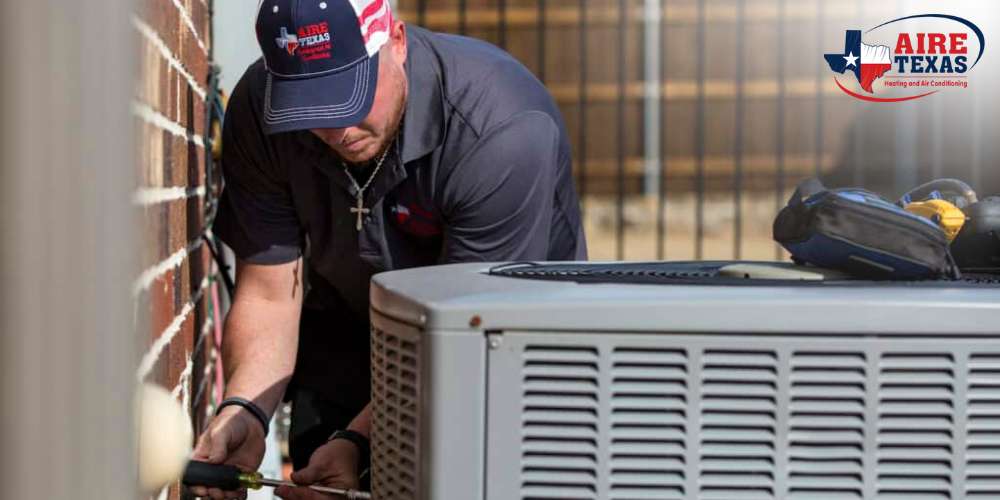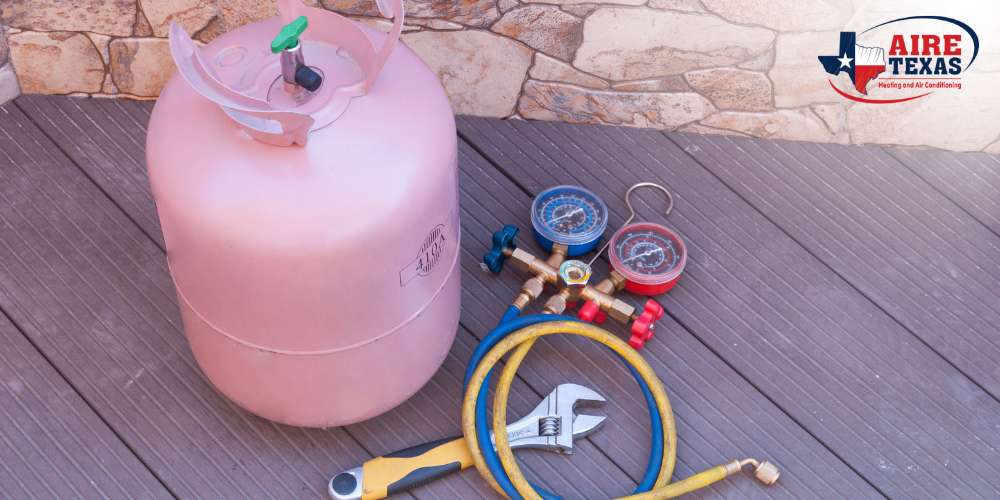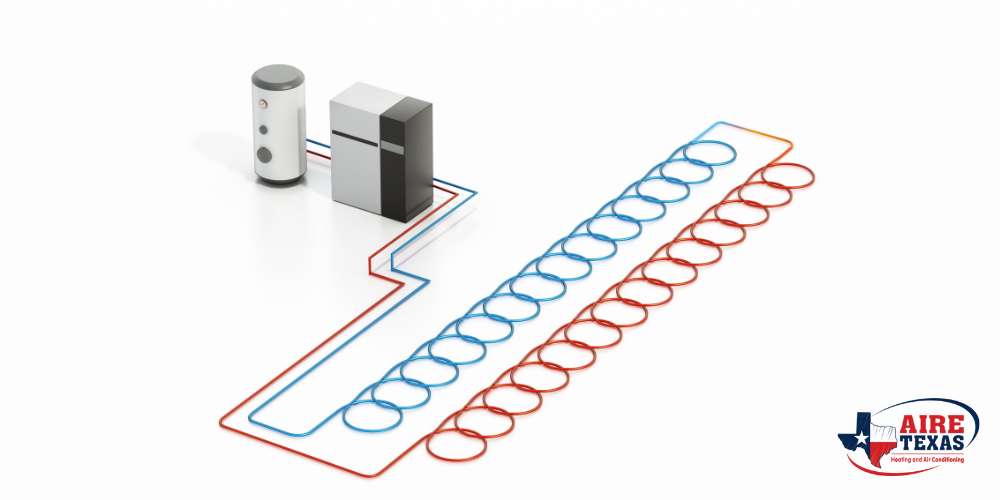Common HVAC Questions and Answers
Frequently Asked Questions About Plano HVAC Systems and Services
Homeowners and businesses throughout Plano, TX and the surrounding communities depend on their heating and cooling systems to maintain a reasonable level of comfort in their homes.
However, HVAC systems are complex pieces of equipment with multiple components working together, so it’s only natural that people without specialized training will have some questions. Here, our Plano HVAC technicians at Aire Texas Heating and Air Conditioning provide some of the most common HVAC questions and answers to help you stay informed about your heating, ventilation, and air conditioning systems.
For more information on any of the following questions or to ask a question you don’t see here, feel free to reach out to a Plano HVAC professional on our team today!
Table of Contents
How Often Should I Change My Air Filter?
Don’t underestimate the importance of clean air filters in keeping your HVAC system efficient and your energy bills in check! The air filter in your air conditioning unit is in place to block allergens from reentering your home’s air and from infiltrating the interior components of your air conditioning and forced-air heating systems.
When the air filter becomes too clogged, it decreases HVAC efficiency. A dirty filter forces your AC unit to work harder, leading to higher energy bills and the increased potential for wear and tear on the system. That’s why regularly replacing or cleaning your air filters is crucial for maintaining optimal airflow and energy efficiency.
According to Energy Star, on average, you should replace air filters every 3 months at a minimum. However, exactly how long depends on a number of factors. We recommend changing your air filter as follows to ensure proper HVAC efficiency:
- 1’’ Filter – every 1-2 months
- 2’’ Filter – every 4 months
- 4’’ Filter – every 6-8 months
- Electronic Air Cleaner – every 3 months
Do I Need to Have My Air Ducts Cleaned?
Duct cleaning is not an annually recommended service like HVAC maintenance, but is a great way to improve your family’s health and can increase the efficiency of your HVAC systems. On average, homeowners should have their air ducts cleaned every 3 to 5 years or so. However, if you or your household members are experiencing illnesses, or if you notice dirty air ducts or vents filled with significant dust or debris, you should consider having them cleaned by an experienced HVAC company as soon as possible.
If you need duct cleaning services in Plano, give Aire Texas a call today!
How Often Should I Receive HVAC Maintenance?
Regular HVAC maintenance is essential for heating and cooling units for a number of reasons, including HVAC efficiency, reduced energy bills, and a longer equipment lifespan. But just how often is “regular?”
It is generally recommended to schedule professional maintenance service at least twice a year to receive the full benefits—once in the spring for air conditioners and once in the fall for your heating system. However, if your system is older or experiencing persistent issues, more frequent check-ups might be necessary. During your Plano heating or AC maintenance appointment, a professional technician will thoroughly inspect, clean, and tune up your system, addressing any minor issues before they lead to major, costly repairs or the need for early replacement.

What Is in the Air I Breathe in My Home?
Indoor comfort isn’t just about having the right temperature. Things like your air quality also play a significant role in your home’s environment.
Many homeowners aren’t aware that the air in their homes are filled with the same pollutants as the outside air. Not only that, but these pollutants can be found in even higher concentrations within the home and require the right combination of indoor air quality solutions to resolve.
The most common contaminants and allergens contributing to poor indoor air quality inside Plano and Dallas homes include:
- Dust
- Pollen
- Particles from Household Cleaners
- Mold Spores
- Pet Dander
The particles from these pollutants degrade your indoor air quality by making the air in your home unhealthy. Fortunately, there are various products and services we provide to improve your home’s air quality. Be sure to speak to one of our Plano indoor air quality specialists at Aire Texas about your options to help determine the best choice for your home.
What is a Mini Split?
A mini-split, also known as a ductless mini split or ductless heat pump, is a versatile and efficient heating and cooling solution for homes and businesses alike. Unlike traditional HVAC systems that rely on air ducts to move warm or cool air, ductless air conditioners work by using an outdoor compressor and one or more indoor air-handling units to distribute air directly into different zones.
This setup provides targeted climate control, making it ideal for areas without existing ductwork. Ductless systems are also generally very cost-effective when it comes to both installing and operating them, helping to reduce energy loss and enhance overall efficiency.
What is a Heat Pump?
A heat pump is a highly efficient type of HVAC system that provides both heating and air conditioning for your home. In cooling mode, heat pumps function like a conventional air conditioner, transferring heat from inside the house to the outside to maintain a comfortable indoor air temperature.
In heating mode, the process is reversed as the heat pump extracts heat from the outside air, even in cooler temperatures, and transfers it indoors to warm your space. This dual functionality makes heat pumps in Plano a versatile and energy-efficient choice for year-round climate control.

Why Is My Thermostat Display Blank?
Homeowners rely on their thermostats to control the temperature of their heating and cooling systems and maintain a certain level of comfort. It can be understandably frustrating to find a thermostat with a completely blank screen, or one that seems to be registering the temperature incorrectly or otherwise not working. There are a number of reasons this can happen.
If you’re having thermostat problems, please try the following troubleshooting tips:
- Change the Batteries – Your thermostat’s batteries should be changed at least once a year.
- Check the Circuit Breaker – A tripped breaker could result in your thermostat losing power.
- Check the Safety Switch – When there’s a problem with your HVAC system, like excessive heat or a condensation buildup, the safety switch can get triggered. The thermostat will shut off as a result. If this occurs, please contact our technicians as an inspection is required.
Whether you have a traditional, smart, or programmable thermostat, it will eventually age just like any other component of your HVAC system, and eventually, it will fail. If you’ve tried the above troubleshooting tips to no avail, it may be time to contact our Plano thermostat installation pros about a potential upgrade.
Why is My Outside AC Unit Not Turning On?
If your outdoor AC unit is not turning on, several potential issues could be at play. First and foremost, check to see if the thermostat settings are correct and ensure that the indoor unit is functioning properly. If not, it could be the result of a tripped circuit breaker or a blown fuse, which can cut power to the outdoor unit.
Additionally, issues with the contactor, a switch in the outdoor unit, can prevent it from activating. Dirty or clogged coils and refrigerant leaks are also potential problems that can affect the performance of outdoor units. If these basic checks do not resolve the issue, it is advisable to contact a professional HVAC technician for a thorough inspection and repair.
Why Is My Air Conditioner Blowing Hot Air?
If your air conditioner is blowing hot air instead of cold air, several factors might be causing the problem. One common issue is a dirty or clogged air filter, which restricts air flow and reduces the efficiency and performance of the cooling unit. Another potential cause could be low refrigerant levels due to a leak, which prevents the system from cooling the air effectively.
Sometimes, a malfunctioning compressor or issues with the condenser unit can also lead to hot air being blown out instead of cold air. If these troubleshooting steps don’t resolve the issue, it’s best to contact a professional Plano HVAC system pro at Aire Texas for a comprehensive diagnosis and repair.

What Size AC Unit Do I Need?
One of the most common HVAC questions we get here at Aire Texas is what size system is needed based on a home’s current set up. The first step in determining the proper size for your cooling and heating units is to evaluate your home’s square footage. It’s also important to consider the location of your home, the local climate, the quality of your insulation, and factors such as how many windows or stories you have in your home.
By taking all these factors into account, an HVAC professional can recommend the appropriate size heating and cooling units to homeowners in the Plano and Dallas-Fort Worth area, ensuring they are tailored to match to their home’s unique needs and provide optimal comfort year-round.
What Is My System’s Seasonal Energy Efficiency Ratio?
A SEER rating is a standard metric used to measure the energy efficiency of central air conditioners, split-system air conditioners, and other HVAC equipment. SEER stands for Seasonal Energy Efficiency Ratio, which is the ratio of cooling output over a typical cooling season divided by the total electric energy input during the same period.
Cooling units with higher SEER ratings are more energy-efficient, meaning they can cool your home more effectively while using less electricity. If you have an older air conditioner with a low SEER rating, it may be time to consider an upgrade. Modern air conditioning systems with higher SEER ratings not only save money on utility bills but also offer better performance and longevity. To learn more about installing a more efficiency HVAC system in your home, call our Plano AC installation technicians at Aire Texas today!
How Often Should I Add Freon to My HVAC System?
Freon (R-22) is a brand name given to a type of refrigerant fluid within your air conditioning system. However, it is currently being phased out due to its harmful ozone-depleting effects and being replaced with safer types of refrigerant, or “coolant.”
But the question remains – do you need to recharge your AC’s refrigerant? Short answer, no.
Air conditioning systems are filled with enough refrigerant to last the duration of their lifecycle. It does not get depleted like gas from a car or oil from an appliance. Therefore, you should never have to add refrigerant or Freon to the system if it is working properly.
If you notice symptoms such as low cooling output or low airflow, you may have a refrigerant leak. The leak must be located and repaired by a professional, and at that point we will refill or “recharge” the refrigerant level.

How Does the R-22 Phase-Out Affect Me?
Commonly called Freon, R-22 is the refrigerant previously used in all air conditioners. It has, as we mentioned, been found to be harmful to the ozone and will be completely phased out by January 2020. This means it will no longer be produced or imported. The Freon phase-out doesn’t mean your AC system needs to be replaced if it still uses R-22, but any repairs that require recharging or refilling your refrigerant can only be done using recycled Freon.
When Does My HVAC System Need to Be Replaced?
Replacing your HVAC system at the right time is important to maintain comfort and improve efficiency in your home. Generally, the life expectancy of most central air conditioning units and furnaces ranges from 10 to 15 years, while natural gas systems and tankless water heaters can last slightly longer (15 to 25 years). Of course, failure to receive regular maintenance or timely repairs can significantly reduce the average lifespan of your unit.
Recognizing the importance of timely replacement when your HVAC equipment is nearing or exceeding these age limits can prevent unexpected failures and ensure consistent comfort in your home. Frequent breakdowns, escalating repair costs, and rising utility bills are also other clear indicators that it might be time to replace your system.
Why Does My Air Conditioner Turn Off By Itself?
If your air conditioning system turns off by itself, there are several issues that could be causing this problem, including but not limited to:
- Dirty or clogged air filters, which restrict airflow and can cause the system to overheat and shut down to prevent damage
- A malfunctioning thermostat that incorrectly signals the system to turn off
- Electrical issues, such as a tripped circuit breaker or faulty wiring
- Safety features, such as sensors detecting overheating or refrigerant issues, may cause it to shut down as a protective measure
If you experience this issue frequently, it’s important to have a professional HVAC technician evaluate your system to diagnose and fix the underlying problem.

How Do I Reset My AC Unit?
There are a few ways you can go about resetting your AC unit. First, you’ll want to flip the power switch to your unit to the OFF button on the circuit breaker panel. Next, check and see if your unit has a simple Reset button on or around the unit. It will likely be a small red button with the word RESET clearly indicated on it. Hold that down for about 5-10 seconds before releasing.
Finally, you’ll want to restore the power supply to your unit, so flip all of the switches you turned off back to the ON position. This should do the trick to reset your HVAC system, but if problems persist, it’s advisable to hire a professional technician for further assistance.
Could My Heating and Cooling System Be Causing My High Energy Bills?
Did you know that your heating and cooling system contribute to approximately 50% of your entire energy bill each month? As such, your HVAC system could indeed be a significant factor contributing to high energy bills.
Older or inefficient air conditioning units and furnaces consume more electricity to maintain comfort, especially if they lack modern energy-saving features. To improve efficiency and maximize energy savings, consider upgrading to a more efficient air conditioning system or furnace.
Installing a programmable thermostat can also help manage energy usage by adjusting temperatures based on your schedule, thereby reducing unnecessary heating or cooling when you’re away or asleep. Additionally, sealing ducts and insulating your home can prevent energy loss, further lowering utility and electricity costs.
Make sure you entrust a qualified HVAC technician to inspect your system and repair any issues so that it will work at its peak performance. You may also consider an upgrade to a more energy efficient model to keep your energy costs down.

What is Geothermal Heating?
Geothermal heating, also called geothermal heat pumps, utilize advanced HVAC technology to harness the consistent temperature of the earth below the surface to provide heating and cooling for homes and buildings. This capitalizes on the fact that the ground remains relatively stable in temperature throughout the year, typically between 45-75 degrees Fahrenheit depending on location and depth.
Geothermal heat pump systems work by circulating water or a refrigerant through underground pipes, known as loops, to absorb heat from the earth in winter and release heat into the ground in summer. By leveraging this renewable and stable heat source, geothermal heating systems offer energy-efficient heating and cooling, reducing reliance on traditional fossil fuels and lowering long-term energy costs and carbon footprints for homeowners.
What Can Be Done about Hot and Cold Spots in My House?
There are a few factors that cause uneven heating and cooling throughout your home. The most common include:
- Improper HVAC Unit Size for Your Home
- Poor Ductwork Insulation
- Poor Attic Insulation
If you experience uneven temperatures in your home, be sure to have one of our experienced experts at Aire Texas check your HVAC system and insulation to determine the root of the problem. We’ll help you make an educated decision on how to proceed from there.
Why is My Air Conditioner Freezing Up?
When your air conditioner freezes up, it’s often due to issues related to airflow or refrigeration. One common cause is dirty evaporator coils, which can restrict airflow over the coils and cause moisture to freeze on them. Another potential culprit is low refrigerant levels or issues with refrigerant circulation, leading to low pressure in the system.
A malfunctioning thermostat or problems with the blower fan can also disrupt the proper operation of the air conditioning system, contributing to freezing. To resolve this issue, it’s recommended to turn off the AC to allow the coils to thaw, check and clean the air filters and coils, and ensure proper refrigerant levels and airflow.
If problems persist, consulting with a professional is highly advisable to diagnose and address any underlying issues affecting the performance of your HVAC equipment.

Call Aire Texas Heating and Air Conditioning to Schedule Service Today!
At Aire Texas Heating and Air Conditioning, we’ve been working in the HVAC industry for over a decade, which means we have the answers to all your HVAC questions and concerns. If we didn’t answer your question here, don’t be afraid to reach out to a member of our team to learn more! We’re committed to providing every business and homeowner who calls on us with superior heating, cooling, and indoor air quality services, all while helping them stay safe, save money, and improve the efficiency of comfort of their property.
Our experienced Diagnostic Engineers, Installation Specialists, Equipment Design Engineers, and Customer Specialists are all among the best. We will thoroughly inspect your system to determine the precise cause(s) of your HVAC issues, and provide you with informed Plano AC repair or replacement solutions to get your system up and running smoothly again.
Have problems with your heating or cooling system? Experience the Aire Texas difference for yourself and see what makes us one of the most relied-upon HVAC companies in the Plano, TX area. Call (972) 424-2473 or schedule service online to talk with a member of our team today.



